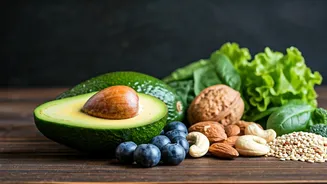Berry's Beneficial Boost
Berries, packed with antioxidants, are a fantastic addition to a heart-healthy diet. These colorful fruits, including strawberries, blueberries, raspberries,
and blackberries, are loaded with anthocyanins, which contribute to their vibrant hues and offer remarkable benefits. Anthocyanins play a crucial role in preventing oxidative stress and inflammation, which are key contributors to arterial damage and heart disease. Their regular consumption can promote the dilation of blood vessels, leading to improved blood flow. By including berries in your meals, you're not just enjoying a tasty treat; you're also actively protecting your arteries and enhancing your overall heart health. Consider adding a handful of berries to your breakfast cereal, blending them into a smoothie, or simply enjoying them as a snack throughout the day to harness their powerful cardiovascular benefits. The natural sugars in berries provide energy without causing a sharp spike, making them a great choice for sustained health benefits.
Leafy Greens' Circulation
Leafy green vegetables, like spinach, kale, and collard greens, are nutritional powerhouses that support healthy arteries and circulation. These greens are rich in nitrates, which the body converts into nitric oxide. Nitric oxide is a critical molecule that helps to relax and widen blood vessels, thereby improving blood flow and reducing blood pressure. Furthermore, leafy greens are packed with essential vitamins, minerals, and antioxidants that protect the arteries from damage caused by free radicals. The antioxidants found in these vegetables combat oxidative stress, which contributes to the development of arterial plaque. To maximize the benefits, incorporate a variety of leafy greens into your diet. Prepare them in salads, stir-fries, or blend them into green smoothies. Regularly consuming leafy greens ensures your body receives the necessary nutrients to keep your arteries flexible and your circulation optimal, supporting long-term cardiovascular health. These greens are low in calories and can be consumed in generous amounts.
Nuts and Seeds' Protection
Nuts and seeds, such as almonds, walnuts, flaxseeds, and chia seeds, offer substantial benefits for arterial health and circulation. These foods are a significant source of healthy fats, including monounsaturated and polyunsaturated fats, which are beneficial for heart health. These fats help to reduce LDL cholesterol levels, often referred to as 'bad' cholesterol, and raise HDL cholesterol levels, known as 'good' cholesterol. Additionally, nuts and seeds contain fiber, which helps to bind cholesterol in the digestive tract, preventing its absorption into the bloodstream. They also provide essential minerals like magnesium, which helps to relax blood vessels and improve blood flow. Incorporating a handful of nuts and seeds into your daily diet is an easy way to support arterial health. Enjoy them as a snack, add them to salads, or sprinkle them on your breakfast cereal. By choosing these natural foods, you’re providing your body with the nutrients it needs to maintain healthy arteries and improve blood circulation. Always be mindful of portion sizes due to their calorie density.
Whole Grains' Vital Support
Whole grains, such as oats, brown rice, and quinoa, play a vital role in supporting arterial health and circulation. They are rich in fiber, which helps to lower LDL cholesterol levels and reduce the risk of arterial plaque buildup. Fiber aids in removing excess cholesterol from the body. Moreover, whole grains provide a steady release of glucose into the bloodstream, avoiding the sharp spikes and crashes associated with refined grains. This process supports better blood sugar control, which is essential for maintaining healthy arteries. The vitamins and minerals in whole grains, such as magnesium, also help to improve blood vessel function. Consuming whole grains regularly is a simple yet impactful strategy to improve your cardiovascular health. Opt for whole-grain bread, pasta, and cereals. Including a bowl of oatmeal for breakfast or adding quinoa to your lunch or dinner is a simple way to reap the benefits.
Avocado's Arterial Allies
Avocados are an excellent food choice for improving arterial health and circulation. They are packed with monounsaturated fats, which are known to lower LDL cholesterol levels while raising HDL cholesterol levels. This is a crucial benefit, as high levels of LDL cholesterol can contribute to arterial plaque formation and increase the risk of heart disease. The potassium content in avocados also aids in regulating blood pressure. High blood pressure puts undue stress on the arteries and can damage them over time. By incorporating avocados into your diet, you provide your body with essential nutrients that support the health of your arteries and improve overall circulation. Enjoy them in salads, sandwiches, or as a side dish. The creamy texture of avocados makes them a versatile and delicious addition to any meal. Adding avocados to your diet is a simple yet effective way to proactively manage your cardiovascular health.












